
- Understanding government grants for solar panels
- Key UK government grants and schemes
- Where Solar Panel Funding sits
- Eligibility criteria for residential and commercial solar panel grants
- How to Find and Apply for Solar Panel Grants
- Common misconceptions about solar panel grants
- FAQs
- Key terms to remember
- Start searching for solar panel funding today
- Getting More from Your Solar Investment
Quick clarity before we start
Solar Panel Funding is not a government grant, and we never claim to be. We are proud that our scheme is privately funded and regulated by the FCA as a credit broker. That is a positive by design. It means no reliance on changing public budgets, no postcode lottery, and no pause when funds run out. We sit alongside government and council options as a stable, transparent route for homeowners who want to move now.
Harnessing the sun through solar photovoltaic (PV) systems has become an increasingly attractive option for UK homeowners, businesses, and organisations.
Solar panels facilitate reduced energy bills, a smaller carbon footprint, and greater energy independence. However, the initial investment can be a hurdle. Fortunately, there are various government grants for solar panels to make systems more accessible.
This guide will provide you with up-to-date information on UK solar panel grants. We’ll explore the different schemes, eligibility criteria, application processes, and other details to help you navigate the landscape of solar panel funding.
Note: Government policies and grant availability can change, so we’ve included links to official sources wherever possible – verify any details before making decisions.

Understanding government grants for solar panels
What are government grants for solar panels?
Government grants are financial aid from the government or public bodies to support activities or projects. Unlike loans, grants do not typically need to be repaid. In the context of solar energy, grants are often used to encourage the uptake of renewable energy technologies.
There are differences between grants, loans, and tax incentives:
- Grants. Direct financial assistance that does not require repayment.
- Loans. Financial assistance that must be repaid, usually with interest. The government may offer low-interest loans for solar installations.
- Tax incentives. Reductions in tax liabilities, such as VAT reductions, are being made to make solar more financially appealing.
Where we fit
We are not a government grant and we never present ourselves as one. We are proud that our scheme is privately funded. It exists to remove or reduce the upfront barrier without relying on taxpayer money. This is a strength because it gives homeowners a consistent option when public budgets change or pause.
Why does the government offer solar grants?
The UK government offers solar grants and incentives for several key reasons:
- Reducing carbon emissions for climate change targets. The UK has committed to reducing greenhouse gas emissions and increasing renewable energy generation. Encouraging solar energy adoption is crucial to meeting these obligations.
- Promoting renewable energy adoption. Government solar panel funding aims to accelerate the transition away from fossil fuels to a more diversified and sustainable energy mix. This also reduces the UK’s reliance on imported energy and enhances energy security.
- Helping homeowners and businesses reduce energy costs. Rising energy prices strain household budgets and business profitability. Improvements such as solar panels can significantly reduce electricity bills, and grants can make this more accessible.
- Boosting the green economy: Solar technologies create jobs and stimulate economic growth in renewable energy. Government support helps to foster innovation and investment in the sector.
Benefits of utilising solar grants
Utilising government grants for solar panels offers several advantages.
- Lower upfront installation costs: Grants directly reduce the financial burden of installing a solar system. This makes solar viable for homeowners and businesses who might be deterred by the expenditure.
- Faster return on investment (ROI). Grants shorten the payback period for an investment. This means that the owner will recoup their investment and benefit from savings sooner.
- Increased affordability of solar technology. Grants make adoption more accessible, contributing to the UK meeting its environmental goals.
Key UK government grants and schemes
These are some of the major government grants to lower solar panel costs.
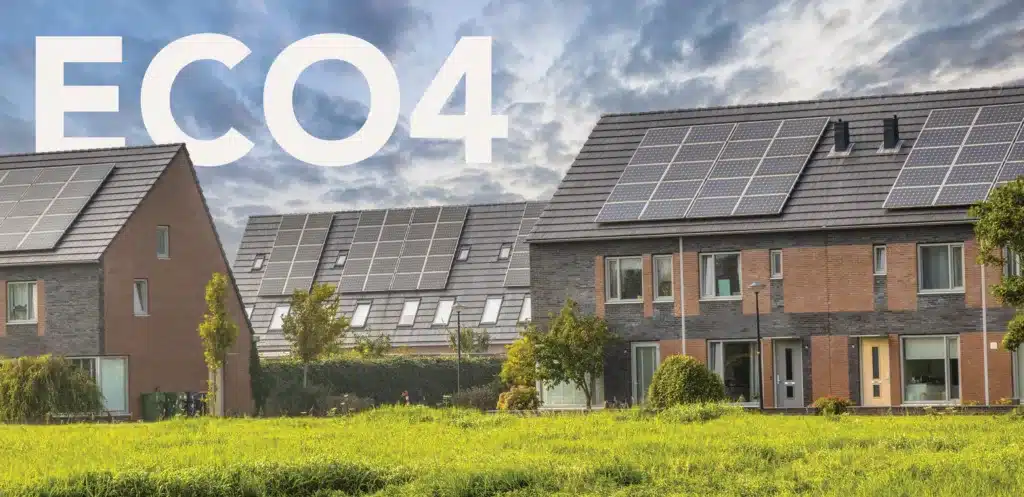
Energy Company Obligation 4 (ECO4)
The Energy Company Obligation (ECO) is a government energy efficiency scheme. ECO4 is the fourth phase of this scheme, placing obligations on suppliers to deliver energy efficiency measures to domestic premises.
- ECO4 requires medium and large energy suppliers to fund and facilitate energy-saving measures in eligible households. The scheme aims to tackle fuel poverty and reduce carbon emissions. While ECO4 primarily focuses on insulation and heating upgrades, it can support the installation of solar panels.
- Obligated energy suppliers (such as British Gas, E.ON, Octopus Energy, and others) are set targets by Ofgem to deliver these measures. They work with installers to carry out installations.
- ECO4 is not a direct grant to homeowners. Instead, energy companies fund the installations in eligible properties.
- Eligibility Criteria:
- ECO4 is targeted at low-income and vulnerable households. Eligibility can vary, but generally includes:
- Low-income households. Households with a combined gross annual income below a certain threshold (e.g., £31,000).
- Receipt of specific benefits. Recipients of certain income-related benefits, such as:
- Income-based Jobseeker’s Allowance (JSA)
- Income-related Employment and Support Allowance (ESA)
- Income Support (IS)
- Pension Credit Guarantee Credit
- Universal Credit (UC)
- Housing Benefit
- Child Tax Credit
- Working Tax Credit
- Property energy efficiency ratings. The property should have a low Energy Performance Certificate (EPC) rating, often E, F, or G, to indicate it needs the benefits.
- ECO4 is targeted at low-income and vulnerable households. Eligibility can vary, but generally includes:
- What ECO4 covers:
- While ECO4’s main focus is insulation and heating, solar panels can be included, particularly when they are part of a package of measures designed to improve the home’s overall heating-based energy efficiency.
- If a home with inefficient electric heating is being upgraded, solar panels might be included to reduce consumption and costs.
- Solar panels are not always guaranteed under ECO4, even if a household meets the other eligibility criteria. The decision depends on the energy supplier, the specific circumstances, and the overall cost-effectiveness of the proposal.
- How to apply:
- Homeowners do not apply directly for ECO4 funding. Instead, the process involves:
- Contacting an energy supplier. Homeowners can contact relevant energy suppliers to inquire about eligibility and potential. Each supplier may have a distinct application process and approved installers.
- Contacting an installer. You can also contact an ECO4-approved installer, who assesses your eligibility and liaises with a supplier on your behalf.
- Energy supplier websites. Many energy suppliers provide information about ECO4 and online application forms on their websites.
- The supplier or installer assesses your eligibility, arranges for a survey, and determines the appropriate measures.
- It’s advisable to contact multiple suppliers/installers to compare offers and ensure you receive the best possible package.
- Homeowners do not apply directly for ECO4 funding. Instead, the process involves:
- Local Authority Flexible Eligibility (LA Flex):
- LA Flex is a component of ECO4 that allows local authorities to expand the scheme’s eligibility criteria.
- This provides flexibility for households who may not automatically qualify. Local authorities can set criteria based on local needs and priorities.
- Local councils might consider factors like:
- Households with health conditions are exacerbated by living in the cold.
- Households in fuel poverty, even if they don’t receive standard qualifying benefits.
- Low-income households in energy-inefficient properties.
- To find out if you are eligible, you should:
- Contact your local council.
- Check your local council’s website for information on ECO4 and LA Flex.
- Energy suppliers and installers should also be able to advise on LA Flex eligibility.
Smart Export Guarantee (SEG)
The Smart Export Guarantee (SEG) is a scheme that enables homeowners and businesses to receive payments for excess renewable electricity they export back to the National Grid. While not a grant, it’s a financial incentive for solar panel adopters.
Note: Check out our blog on the best SEG rates out there!
- Explanation of the SEG scheme:
- The SEG requires electricity suppliers to offer tariffs to small-scale generators of renewable energy. If you have a solar PV system, you can get paid for any surplus electricity you send to the grid.
- The SEG replaced the Feed-in Tariff (FIT) scheme, which provided payments for generated and exported electricity. The SEG focuses specifically on export payments.
- How homeowners get paid:
- If your solar panels generate excess electricity, it’s exported to the grid.
- Your energy supplier will measure the amount of electricity you export and pay you per kilowatt-hour (kWh).
- The payments offset the cost of your electricity bills and improve your overall return on investment.
- Eligibility requirements:
- To be eligible for SEG payments, your solar PV system must meet certain requirements:
- MCS-certified installation. The system must be installed by a Microgeneration Certification Scheme (MCS) certified installer.
- Eligible renewable energy systems. The SEG covers various renewable electricity generation technologies, including:
- Solar photovoltaic (PV)Wind turbinesHydroelectric systemsMicro combined heat and power (CHP)Anaerobic digestion (AD)
- To be eligible for SEG payments, your solar PV system must meet certain requirements:
- SEG Tariffs:
- Electricity suppliers offer different tariffs, which vary in terms of:
- Payment rate.The amount paid per kWh of exported electricity.
- Tariff type:
- Fixed tariffs. Offer a set payment rate for the duration of the agreement.
- Variable tariffs. The rate can change depending on market conditions.
- Contract length. The duration of the agreement.
- Remember, you are not required to take an SEG tariff from your electricity supplier, so shop around for tariffs.
- Electricity suppliers offer different tariffs, which vary in terms of:
- How SEG interacts with other incentives:
- SEG payments are separate from any other solar panel grants for businesses or homes you might receive. For example, you can benefit from both VAT reductions and SEG payments.
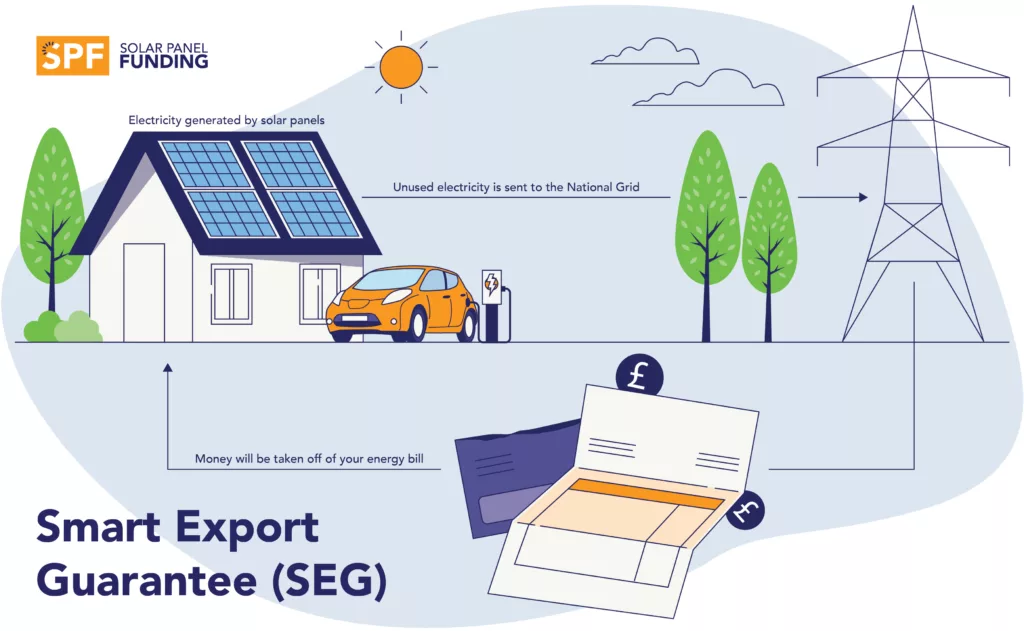
VAT reduction on solar panels
- The temporary 0% VAT rate on the installation of solar panels:
- The UK government has implemented a temporary 0% Value Added Tax (VAT) rate on the supply and installation of energy-saving materials, including solar panels.
- Eligibility and timeframes:
- The 0% VAT rate applies to solar panels in residences.
- The rate is in place until March 2027.
- This reduction applies to the supply of solar panels and their installation.
Regional schemes
While many of the primary schemes operate across Great Britain, there are also specific regional initiatives.
- Scotland:
- Home Energy Scotland grant and loan:
- Home Energy Scotland provides advice and support on energy efficiency and renewable energy to homeowners in Scotland.
- The scheme combines grants and loans to help cover the cost of installing energy-efficient measures, including solar panels.
- The funding available can vary and change over time, and there may be specific conditions that apply, so check the Home Energy Scotland website for the latest details.
- Home Energy Scotland grant and loan:
- Wales:
- Nest scheme:
- The Nest scheme is a Welsh Government initiative for advice and support to help people in Wales make their homes energy efficient and reduce bills.
- Nest offers a range of support, which can include free energy efficiency improvements.
- Eligibility for full support is targeted towards those most in need, such as low-income households, those receiving certain benefits or those with specific health conditions.
- Nest scheme:
- Northern Ireland:
- Currently, there are no schemes dedicated to solar PV in Northern Ireland in the same way as ECO4 in Great Britain. However, this does not mean there is no renewable energy support.
- The Northern Ireland government has various initiatives to promote energy efficiency and renewable energy, such as the Renewable Heat Incentive (RHI).
Energy policy and support schemes vary significantly between different parts of the UK. Always check the specific schemes and criteria for your particular region
Future schemes and funding
The UK government’s commitment to reducing carbon emissions and the Net Zero scheme support for solar energy will continue in some form.
- Stay informed about any upcoming schemes, changes to existing grants, or new policy developments.
- Government consultations, policy announcements, and updates from the Department for Energy Security and Net Zero (DESNZ) will provide insights into the future of solar panel funding.
- Keep an eye on official government websites and reputable sources for the latest information.
Where Solar Panel Funding sits
Solar Panel Funding is a privately funded, FCA-regulated route. We do not rely on public budgets, and we work alongside government and council options.
- We assess your home and goals
- We present clear funding options in plain English
- We only use accredited installers and issue MCS certificates
- You stay in control and can compare with any public or council offer
Why being private and regulated helps
- No reliance on government funds or election cycles
- Consistent criteria and quicker decisions
- Clear documents and consumer protection under FCA rules
- Works alongside local schemes if those suit you better
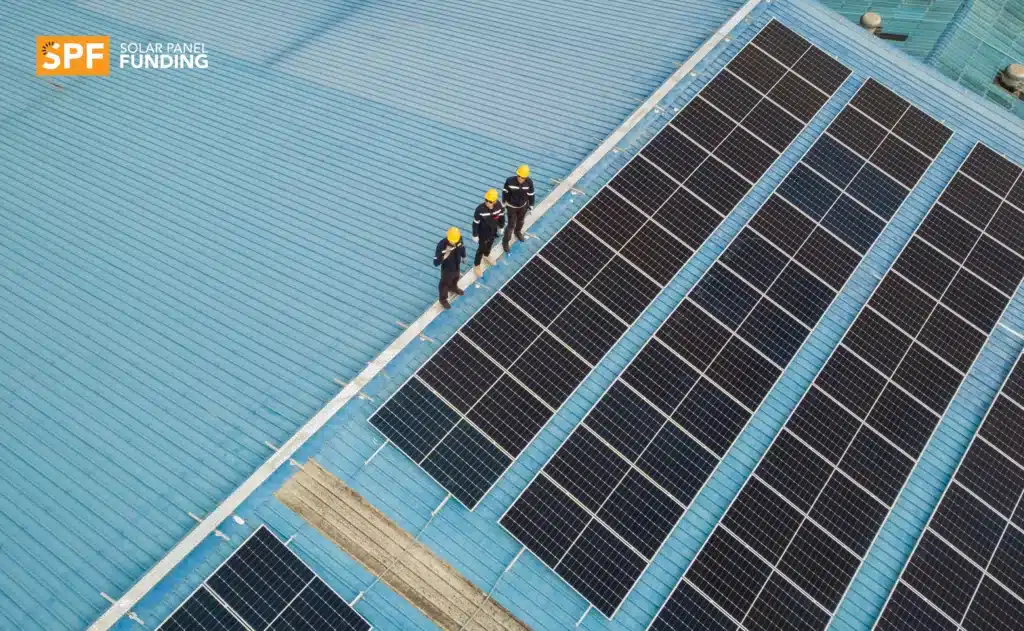
Eligibility criteria for residential and commercial solar panel grants
While each grant and scheme has specific eligibility criteria, some general factors commonly influence stakeholders in the UK:
- Homeowner vs. business/organisation:
- Most solar grants are aimed at homeowners. However, some schemes are available for businesses, organizations and community projects.
- Property type and location:
- Eligibility can depend on the type of property and its location.
- Income levels and benefit receipt:
- Many grants target low-income households or those receiving specific benefits.
- Installation standards (MCS Certification):
- Most schemes require solar PV systems to be installed by Microgeneration Certification Scheme (MCS) certified installers.
It’s crucial to refer back to the specific eligibility criteria outlined in the detailed sections for each grant scheme, as these will provide the most accurate information.
How to Find and Apply for Solar Panel Grants
Navigating the process of finding and applying for government funding for solar panels can seem complex, but here’s a general guide to help you get started:
- Where to Find Information:
- Government websites (GOV.UK): The GOV.UK website is a central source for information on government services and schemes. It provides guidance on energy grants and related topics.
- Energy supplier websites: Major energy suppliers (e.g., British Gas, EDF, E.ON, Octopus) often provide information on available grants and schemes, and how to apply through them.
- Energy advice organisations: Organisations like the Energy Saving Trust offer impartial advice and information on energy efficiency and renewable energy, including available funding.
- Local council websites: Local councils may administer or provide information on specific local grants or initiatives related to solar energy.
- General Application Process:
- The application process can vary depending on the specific grant or scheme, but generally involves these steps:
- Checking eligibility: The first step is to determine whether you meet the eligibility criteria for the grant you are interested in. Carefully review the requirements on the official websites.
- Gathering documentation: You will likely need to provide supporting documents, such as proof of income, benefit entitlement, property details, and potentially an Energy Performance Certificate (EPC).
- Contacting suppliers/installers: For some schemes, you may need to contact approved energy suppliers or installers to apply or to have the installation carried out.
- Submitting applications: Follow the specific application instructions provided by the relevant organisation (e.g., energy supplier, local council).
- Property survey: A survey of your property may be required to assess its suitability for solar panels and the feasibility of the installation.
- Importance of Using MCS-Certified Installers: As mentioned earlier, many grant schemes, particularly the Smart Export Guarantee (SEG), require that solar PV systems be installed by MCS-certified installers. This is crucial for ensuring quality, safety, and compliance with scheme requirements.
- The application process can vary depending on the specific grant or scheme, but generally involves these steps:
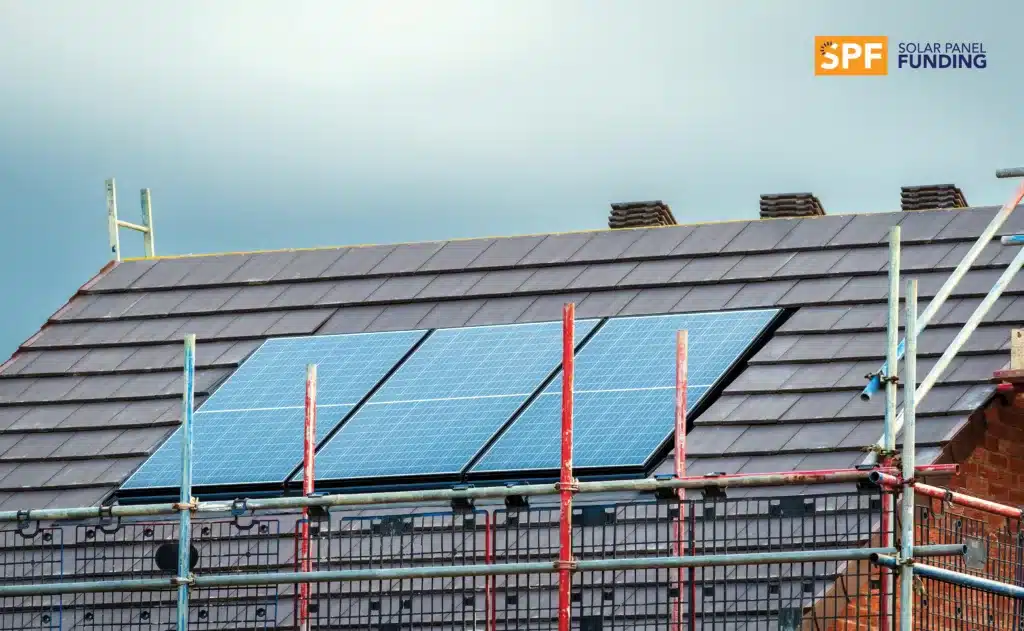
Common misconceptions about solar panel grants
Here are some common misconceptions about solar panel grants:
- “Solar panels are always free with grants.” While some grants can cover significant costs, it’s rare for them to cover the entire cost.
- “Grants are only for certain types of homeowners.” While many grants target low-income households, some incentives are available to a wider range of homeowners and even businesses.
- “The application process is too complicated.” The application process can involve some paperwork, but resources and guidance are available.
FAQs
What is the best solar panel grant currently available?
The “best” grant for solar panels depends on your circumstances. For low-income households, ECO4 can provide substantial support, whereas the SEG provides ongoing payments for most solar PV owners.
How do I know if I qualify for a solar grant?
Carefully review the criteria for each scheme on the official websites (e.g., GOV.UK, Ofgem, Energy Saving Trust). Contact energy suppliers or installers for additional assistance.
Can I get a grant for solar battery storage?
Grants for solar battery storage are less common than those for panels. However, some schemes or local initiatives may offer support.
Are there grants for businesses installing solar panels?
While many schemes focus on residential installations, some incentives might be available for businesses. It’s advisable to research specific programs or consult with advisors.
How long does it take to get a solar panel grant?
The application and approval process time can vary significantly depending on the grant scheme and your application. Enquire about timelines when you apply!
Do solar grants cover the entire cost of installation?
It’s uncommon for a grant to cover the entire cost. Most grants contribute to a portion of the expenses for affordability.
Key terms to remember
Here are definitions of some key terms surrounding grants for solar panels:
- MCS (Microgeneration Certification Scheme). A UK accreditation scheme that certifies microgeneration products (PV panels) and installers, ensuring quality and safety.
- SEG (Smart Export Guarantee). A government scheme that requires suppliers to pay small-scale generators for surplus electricity exported to the National Grid.
- EPC (Energy Performance Certificate). A certificate that rates a property’s energy efficiency, often used to determine eligibility for grants.
- Feed-in Tariff (FIT). A previous government scheme (now closed) that provided payments for both electricity generated and exported from small-scale installations.
Start searching for solar panel funding today
Government grants and schemes are vital to making solar energy more accessible and affordable for UK homeowners, businesses and organisations. By reducing upfront costs and providing ongoing incentives, these initiatives encourage the adoption of the energy of the future.
Remember, the information provided here is general guidance only. Always verify details and eligibility criteria on the official websites of government bodies, energy suppliers and any other relevant organisations.
To take the next step towards harnessing the power of the sun, visit our website today! Just plug in a few details, like your postcode and homeowner status and we’ll help you secure any eligible funding for your investment into solar panels. Also, visit our blog for more insights into solar power and funding schemes.
Getting More from Your Solar Investment
Adding solar panels and batteries to your home not only boosts your energy independence but also improves the value and comfort of your property. With the warm homes plan in mind, investing in solar technology can make your house more efficient and resilient, helping you make the most of renewable energy while potentially lowering your bills. Pairing solar panels with batteries means you’ll store more of the clean energy you generate for use when you need it most.

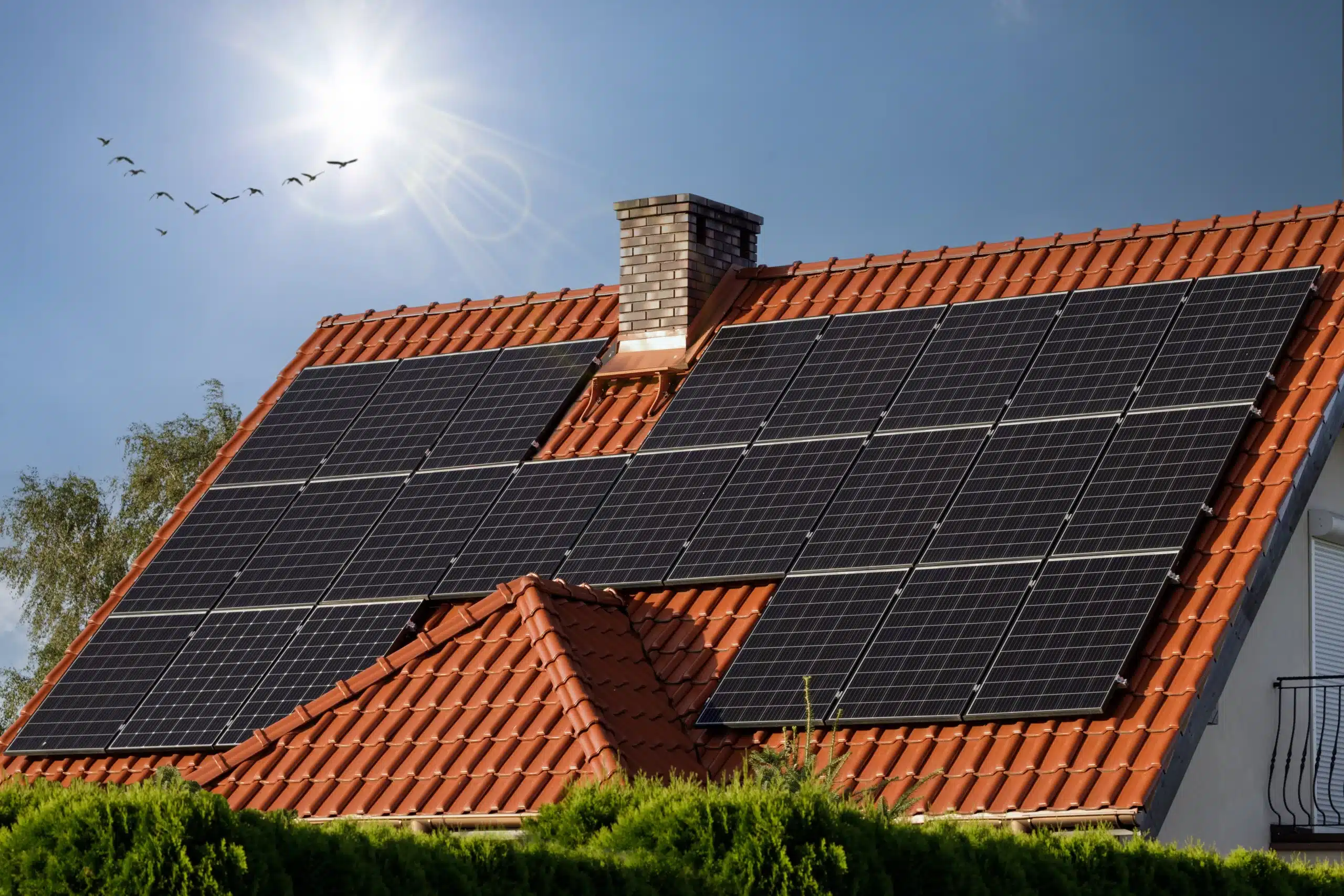


![Can You Fit Solar Panels on a Flat Roof in the UK? [2025] 9 can you fit solar panels on a flat roof in the uk](https://www.solarpanelfunding.co.uk/wp-content/uploads/2025/10/Blog_Can-You-Fit-Solar-Panels-on-a-Flat-Roof-in-the-UK-1024x1024.webp)